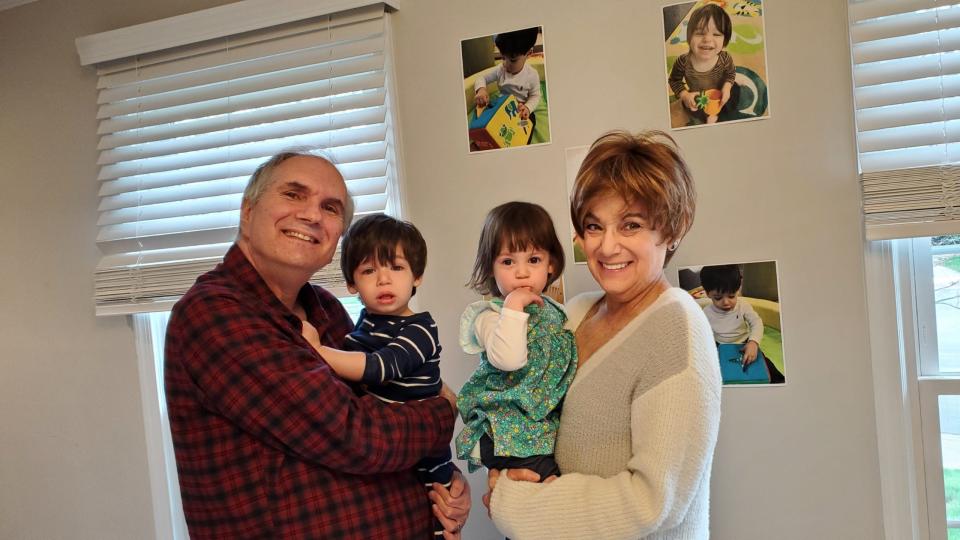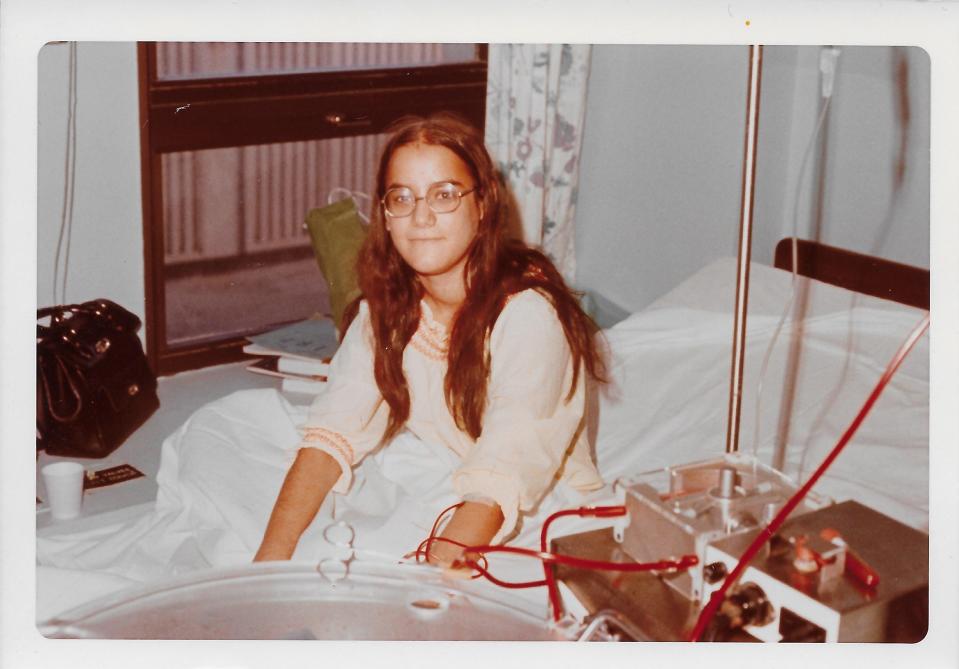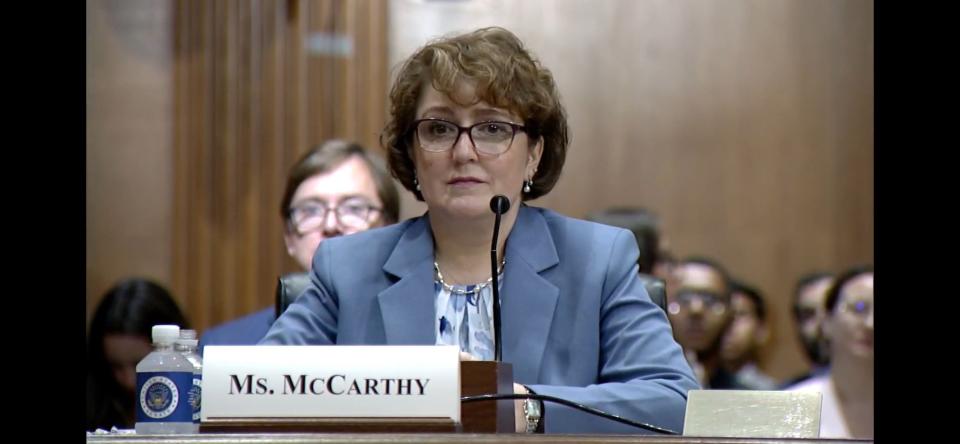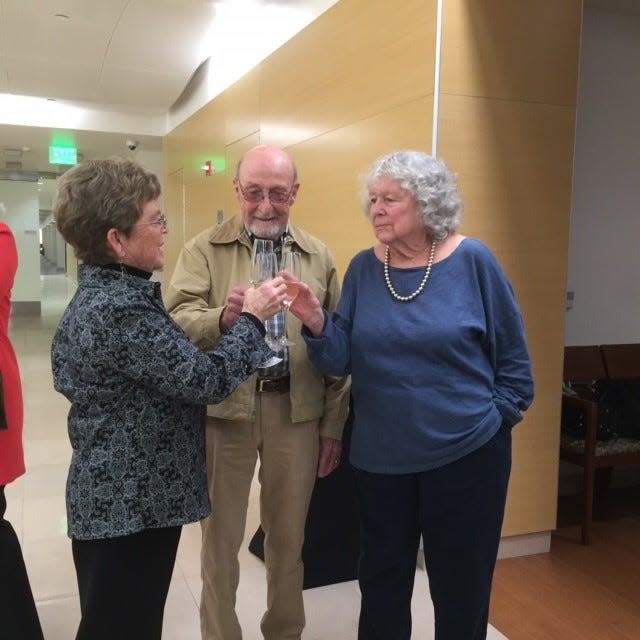Kidney transplants usually last 10 to 15 years. Hers made it 50, but now it's wearing out.
Sharon Stakofsky-Davis and Denice Lombard both carry 90-something-year-old kidneys in their 60-something-year-old bodies.
They are outliers in more than just the obvious ways.
Both women received kidneys from their respective fathers when they were teenagers after their own kidneys gave out. The late 1960s and early 1970s were still the early days of transplantation, when children were given a 50-50 shot of surviving more than a year after a transplant, and it wasn't clear whether donating a kidney would endanger a donor's life later on. (It doesn't.)
More than a half-century later, both women are still around, as is Lombard's father, at nearly 95. Stakofsky-Davis' died many years ago unrelated to his donation. Now his kidney is essentially dying, too.
Stakofsky-Davis is one of the 20% of people on the kidney transplant waiting list who already has received at least one transplant. More than 100,000 Americans are on wait lists for a new organ, nearly 90% of them for a kidney.
Today, everyone who receives a transplant has a good chance of surviving both the procedure and the crucial months afterward when rejection is most likely.
But the medication given to prevent that early immune attack dooms the kidneys in the long run.
Tacrolimus reduces rejection rates from as high as 50% to 60% down to just 10% to 15%, said Dr. Leo Riella, medical director of the kidney transplant program at Massachusetts General Hospital in Boston. But it and other routinely given medications also increase the risk for diabetes, high blood pressure, cardiovascular disease, some cancers, mood swings, insomnia, infections and kidney failure.
"It's a necessary evil," said Dr. Nicole Ali, medical director of kidney transplantation at NYU Langone Health.
The average lifespan of a kidney for someone who receives the organ from a living donor, as Lombard and Stakofsky-Davis did, is about 15 years. For a recipient from a deceased donor, it's closer to 10 years.
The fact that Stakofsky-Davis has lived with her kidney for 51 years and Lombard for 56, Ali said, confirms that researchers trying to develop alternative approaches are on the right path.
"This is a story that shows there's no clock on your kidney. It can last incredible amounts of time if you take great care of yourself," she said. "Not every kidney is going to last this long, but the fact that you can get a kidney to last that long is a great inspiration to people."

Living the best life for your kidney
Ali said Lombard and Stakofsky-Davis must have done an amazing job of taking care of their kidneys, even through their rebellious late teens and 20s when many people struggle.
Though Lombard acknowledges she experimented with some drugs not provided by her doctors during those defiant days, she followed orders otherwise. Stakofsky-Davis hasn't missed a dose of medication in 51 years.
"I never was reckless. Never," said Stakofsky-Davis, a retired teacher now living in Fairfax County, Virginia. "It just meant so much to me to be able to live a normal life that I wasn't going to screw that up."
Stakofsky-Davis doesn't know what childhood ailment destroyed her own two kidneys. Possibly it was a strep infection or a genetic kidney problem that wasn't seen in anyone else in the family.
She has been largely healthy since receiving her father's kidney when she was 14 and Lenny, who ran an ice cream shop in Brooklyn, was 39.
A year ago, her transplanted kidney began to show signs of decline.

Doctors said she'd probably get another year or 18 months out of it. Family members and friends began checking themselves to see if they might be good matches to donate. No one who was a good candidate for donation had her O-positive blood type.
Four months ago, her younger son, Evan, 33, donated one of his kidneys anyway. (To volunteer to be an organ donor, visit organdonor.gov.)
Such a "chain" donation bumps Stakofsky-Davis up on the list to receive a live donor transplant.
In the meantime, though, her need has become a crisis. Despite her best efforts, her father's kidney essentially failed in late July, and she has been receiving dialysis for 3½ hours every Monday, Wednesday and Friday for more than a month. It's taking a severe toll.
"I'm feeling awful," she said Thursday, one of the few days she had enough energy for an extended conversation. She's tired, sick, dizzy, not feeling like herself. "I was a very high-energy person."
The ultimate price of a kidney's lifespan
Molly McCarthy knows the drill all too well. At 50, the Redmond, Washington, resident is living with her third transplanted kidney in 32 years.
Her mother's and father's kidney lasted 10 to 12 years each, and she has had a deceased donor's for 11 years now.
But she's frustrated that so little has changed in the field since her first transplant, when she was 17.
McCarthy, who recently testified before Congress on behalf of transplant recipients, sees advocating for new therapies and approaches as just another way to protect the "ultimate gift" she was given by her parents, as well as her anonymous donor.
"She was generous enough to give me a part of herself and I feel her presence with me," McCarthy said. "I feel the need to be an advocate for her."

It's hard to balance the need to protect the organ but also to know that the medication you're taking is destroying it, McCarthy said. Coping with the contradiction requires a "weird bending of your brain."
The writer Amy Silverstein, a friend and fellow organ transplant advocate, recently died of transplant-related cancer, likely brought on by the medications she took to tamp down her immune system after two heart transplants.
When Silverstein was healthy, she used to say: "We've got to speak on behalf of the patients who are not in our state of health," said McCarthy, who was born with a form of polycystic kidney disease that doomed her own kidneys.
Now she goes on without her friend. "It's a debt I owe."
Working to make a difference
Riella, at Massachusetts General, said he hopes the field will soon be moving to drugs that are less toxic. A study published last week, for instance, found a medication called AT-1501 prevented transplant rejection in primates without damaging their kidneys.
And Ali's team at NYU is among several research groups working toward the "holy grail" of enabling transplants without needing anti-rejection medication at all.
The aim is to teach the recipient's immune system to tolerate the donated organ as its own. This is possible by getting the recipient to "engraft" bone marrow stem cells from the donor, giving them an immune system that is part their own and part their donor's.
Massachusetts General initially succeeded with this approach about 20 years ago. That patient still has her kidney and remains healthy.
The program hit some roadblocks and so wasn't expanded, but now the hospital is trying again. It created a center this summer that offers a "tolerance protocol" to patients who qualify.
The approach requires patients to undergo radiation therapy to kill off some of their own immune cells to reduce the immune attack on the donated organ and make room for the donor's stem cells.
Typically, at Massachusetts General, NYU and Stanford, where the procedure also has been used, it is given to patients at the same time as their organ transplant.
At University of California, Los Angeles, Dr. Jeffrey Veale has been working for a decade to provide the same kind of tolerance − but retroactively, long after the organ is transplanted. Because patients are not always in the best of health when they need a new organ and because the drug takes years to damage kidneys, he envisions transplanting stem cells some time after the organ.
"There are tens of thousands of people (who already have transplants), who want to get off their meds and also want their brother's kidney to last the rest of their lives," he said.
So far, Veale and his team have done six stem cell transplants at the same time as the organ and have just started experimenting with later ones. The first attempt, with a man who received a kidney from his brother a year ago and stem cells more recently, just proved successful. That young man should be off the last of his medications within a month, Veale said.
He is now waiting for results due in early September in a patient who received a kidney from his sister four years ago.
Veale is starting with well-matched siblings and then will try with people who are less well matched to their donors.
Eventually, he hopes to get the process to work even with deceased donors whose stem cells could be harvested and frozen at the time of their death and used later to "tolerize" their organ recipient.
Matching matters
Lombard, 69, of Ventura, California, feels incredibly lucky that her father's kidney is still functioning so well inside her. She believes they're the oldest living donor-recipient pair, though she can't prove it.
They probably lucked into a near-perfect match.

There are several ways donors and their recipients can match. The first, is blood type, then HLA (for human leukocyte antigen) proteins in the blood that identify to the immune system what is "self" and what isn't.
"The closer the match, the longer the lifespan of the kidney," said Dr. Sunil Patel, program director of the UMC Center for Transplantation in Las Vegas.
The longevity of a transplant also depends on how the surgery goes, post-op recovery, how well the patient tolerates medications, how consistently they take the medications and what complications they develop, if any, Patel said. "If you get a good start from a good living donor that's a great match, you're set up for success," he said.
In the past five years, researchers have identified a deeper level within HLA called eplet matching that seems to make a big difference.
Ali compared it to matching two neighborhoods by finding similar driveways, hedges, house colors and front doors. The houses don't have to be identical as long as these "building blocks" are.
"The more matched you are at the building blocks of the molecules, the better we know those kidneys do," she said.
Doctors are now trying to do a better job of matching patients and donors according to these building blocks. Lombard and Stakofsky-Davis probably coincidentally shared a lot of those building blocks with their fathers, she said.
Lombard's path to a kidney transplant was a difficult one.
She and her identical twin were born in 1954 ‒ the same year a kidney transplant first succeeded in extending a man's life. Treated at Massachusetts General, he received a kidney from his identical twin.

The Lombard girls were born with a genetic disorder that left them intersex and with failing kidneys. Diane’s kidneys deteriorated more rapidly, and she died at age 7.
Their father was determined not to lose another child, so when Denice's kidneys started going at age 13, he volunteered one of his own.
Doctors nearly turned him down because survival rates were so poor at the time, but eventually they relented when a visiting surgeon agreed to the procedure.
Lombard, a retired court reporter, and her father, Ted, exchange cards every year on her transplant anniversary. One year, she got a local movie theater to post a thank-you on its marquee.
Like Stakofsky-Davis, Lombard follows a healthy, meat-free diet, stays active and takes her medication reliably.
She also advocates on behalf of progressive politics and live kidney donations and speaks to anyone who reaches out to her with questions about transplants.
"It's the least I can do," she said. "I don't worry about the future, even though I know what Sharon (Stakofsky-Davis) is going through could be my future, so I'm paying attention."
For her part, Stakofsky-Davis hopes that she'll get another kidney soon and that it will last a very long time.
"I want to go to my grandchildren's weddings and I'll be happy," she said.
The oldest recently turned 3, and she has a third on the way.
Contact Karen Weintraub at kweintraub@usatoday.com.
Health and patient safety coverage at USA TODAY is made possible in part by a grant from the Masimo Foundation for Ethics, Innovation and Competition in Healthcare. The Masimo Foundation does not provide editorial input.
This article originally appeared on USA TODAY: Kidney transplant advances aimed at less toxic drugs, better matches

